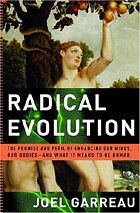The Promise and Peril of Enhancing Our Minds, Our Bodies -- and What It Means to Be Human
by Joel Garreau
 Joel
Garreau's new book, RADICAL EVOLUTION, begins with a thought experiment.
Sometime in the future, your daughter returns home from her first year
at law school not talking about torts or civil procedure, but about her
classmates. These classmates are a bit different. Many of them have been,
in some way or another, "enhanced." She ticks off the various
ways that the enhancement takes effect --- internal wireless modems that
download any piece of information needed directly into the brain, something
akin to telepathy, self-healing, and (at least in theory) immortality
in its own self.
Joel
Garreau's new book, RADICAL EVOLUTION, begins with a thought experiment.
Sometime in the future, your daughter returns home from her first year
at law school not talking about torts or civil procedure, but about her
classmates. These classmates are a bit different. Many of them have been,
in some way or another, "enhanced." She ticks off the various
ways that the enhancement takes effect --- internal wireless modems that
download any piece of information needed directly into the brain, something
akin to telepathy, self-healing, and (at least in theory) immortality
in its own self.
Garreau uses this thought experiment to ask the serious questions about the coming revolutions in genetics and technology that are radically changing human evolution --- and whether such radical changes are beneficial or possibly ultimately harmful to the very idea of humanity itself.
The best and most intriguing parts of RADICAL EVOLUTION are the parts
about laboratories and the people who work in them, and the different
applications that the new genetic and nanotechnology scientists are coming
up with. The research --- which is either promising or horrifying, depending
on your point of view of any given issue --- is compelling and important,
and could change our world forever. RADICAL EVOLUTION purports to describe
the ongoing revolution in technologies that promise to change our bodies,
our genomes, and possibly even our nature as human beings.
Garreau's work is divided into different scenarios. One that he calls "Heaven" is largely the vision of Ray Kurzweil, one of the founders of modern assistive technology. (About half of the technologies discussed in RADICAL EVOLUTION are designed to be assistive technologies to help make people with disabilities more independent.) Kurzweil imagines a future where the positive aspects of the new technology are available freely to everyone, allowing each of us to customize our own selves to the point where immortality --- or complete spiritual freedom from the body, if that's what you want --- is more than a promise or a legend or a fable. Countering Kurzweil's vision are the prophets of doom, led by Silicon Valley pioneer Bill Joy, who worry that unrestricted experimentation with self-replicating nanobots could result in the entire planet turned into food for invisible, ravenous robots.
The environment in which RADICAL EVOLUTION takes place is in the laboratories, offices, and academies. We do not, as of yet, know the nature of these technologies or what they will do for us --- or to us. The promise is that they will help us, cure us, or possibly even assist us in transforming into something beautiful and splendid. The danger is that they will destroy us totally or take away some of that which makes us human.
Garreau brings up two other scenarios --- "Prevail" and "Transcend," which posit that there will be a struggle in dealing with the new technologies, but that the worst of the "Hell" scenarios can be avoided. But there is no way, now, to know which of these scenarios will win out. RADICAL EVOLUTION, if it does nothing else, helps us realize that there's a lot left to understand, and an uncertain future ahead.
Excerpted from a review by Curtis Edmonds in bookreporter.com, 2005